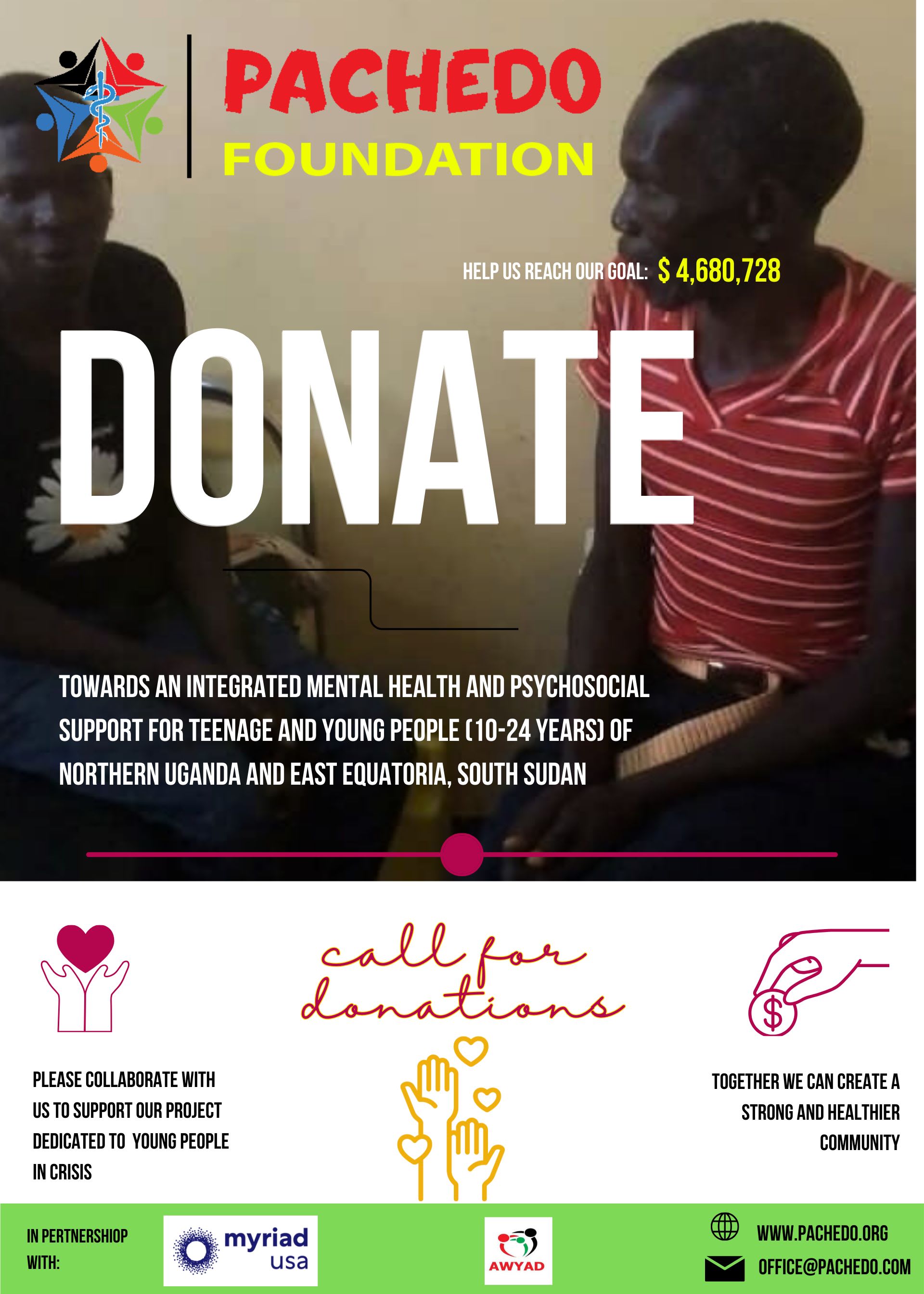
Mental health Psychosocial support for young people n crisis
- Raised
- $0
- Goal
- $2,800,000
Project: INTEGRATED MENTAL HEALTH CARE AND PSYCHOSOCIAL SUPPORT FOR TEENAGE AND YOUNG PEOPLE IN CRISIS IN NORTHERN UGANDA AND EAST EQUATORIA OF SOUTH SUDAN.
The project addresses the mental health and psychosocial needs of adolescents and young people in northern Uganda and eastern Equatoria, South Sudan—regions recovering from decades of civil conflicts, ongoing tribal wars and impacts of COVID-19. These challenges have led to mental health and psychosocial crisis among the adolescents and young people who constitute over 73.2% of the population, including refugees, internally displaced persons, and resettling communities. prevalence of suicide stands at 15%, PTSD and depression at 21%, anxiety disorders at 2.9%, with high neurological disorders like epilepsy and substance abuse experienced in families, communities and schools. The conflicts included forced recruitment, sexual violence that was frequently used as a weapon of destruction, and other atrocities, left many physically and mentally wounded and incapacitated. Young women faced additional burdens such as stigma, discrimination, high risks of violence and poverty after returning from abductions with fatherless children or experiencing teenage pregnancies which increased significantly during the COVID-19 lockdown. These challenges disrupt education, limit opportunities, and have exacerbated various mental health and psychosocial issues.
Despite the growing need, mental health care and Psychosocial support in these regions is critically under-resourced. Services are inadequate, mental health professionals are scarce, and community stigma remains high, with only 1% of health budgets allocated to community mental health. This project seeks to address these pressing challenges to timely respond to mental health and psychosocial crisis and accelerate post conflict and resettlement efforts of conflict and COVID-19 affected communities of Northern Uganda and IDPs and communities in Eastern Equatoria of South Sudan.
The donations will provide durable community mental and psychosocial care, rehabilitation and social economic needs of teenage and young people (10-24 years) and socially excluded persons presenting with mental health and psychosocial needs, social, economic, protection and health needs as provided below:
-Provide mental health and psychosocial awareness and engagements in schools, communities and institutions.
-Support mental health outreaches at health facilities and mobile clinics in communities and schools (procure buffer stock of psychotropics medicines, equipment’s-minibuses, motorcycles and bicycles and mental health workers stipend to conduct clinic checks).
-Train Primary Health Workers (PHWs) and Village Health Teams (VHTs) to integrate and provide quality mental health care and psychosocial support at health facilities.
-Set up and strengthen Reporting, Tracking, Referral and Response (RTRR) systems for cases of mental health crisis in school, community to regional and national hospitals for specialized mental health response.
-Provide community based mental health and psychosocial support activities for teenage and young people receiving treatment (patients-users) and those identified with mental health and psychosocial challenges (Journey of life sessions-JOL, Cognitive Behavioral Therapy (CBT) at group and Interpersonal.
-Construct and support two well-furnished community MHPSS service centers (HCIV Standard) to provide specialized traditional MHPSS care package, rehabilitation in northern Uganda and Eastern Equatoria of South Sudan.
-Support teenage and young people to engage in micro enterprises, value addition and skilling vocational and apprenticeship on various trade areas based on Science, Technology, Economics and Mathematics (STEM) model and other smart agricultural producer enterprises.
-Set up regional business hubs for market access, skilling and employment for youth. --Conduct formative and implementation research to assess the mental health and psychosocial situation in northern Uganda and evaluate the effectiveness of interventions.
